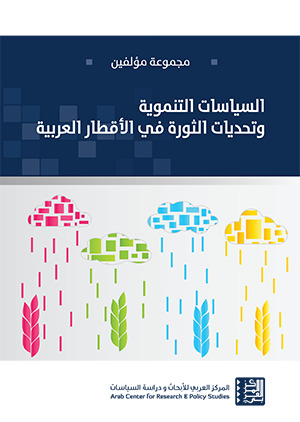 What form should Arab economic policies take in the wake of the popular revolutions of the Arab Spring? A single book cannot answer this problem in its entirety, but a recent publication from the Arab Center for Research and Policy Studies (655 pp.) includes some of the latest thinking by Arab scholars on these points. Based on the proceedings of a conference hosted by the ACRPS in March 2014, the volume is a compendium that covers the geographical and economic diversity of the Arab region. It includes contributions by 17 scholars who seek to understand the economic circumstances that made widespread popular rebellions inevitable in 2011.
What form should Arab economic policies take in the wake of the popular revolutions of the Arab Spring? A single book cannot answer this problem in its entirety, but a recent publication from the Arab Center for Research and Policy Studies (655 pp.) includes some of the latest thinking by Arab scholars on these points. Based on the proceedings of a conference hosted by the ACRPS in March 2014, the volume is a compendium that covers the geographical and economic diversity of the Arab region. It includes contributions by 17 scholars who seek to understand the economic circumstances that made widespread popular rebellions inevitable in 2011.
Noted Arab development expert, and former member of the Board of Directors of the ACRPS, Ali Abdelgadir Ali, contributes the third chapter to this book where he explores the economic policies adopted by Arab governments between 2000 and 2010. As illustrated elsewhere in the work, these policies tended to fall in line with the "Washington Consensus," a broad set of recommendations for developing countries promoted by global financial institutions such as the World Bank and the International Monetary Fund and which rose to prominence towards the end of the Cold War. The authors of other chapters provide examples of how the mismatch between policy prescriptions and social needs led to tensions across not only those countries which witnessed uprisings during the Arab Spring, but throughout the entire region.
While the other chapters of the book are in agreement that the economic conditions of the Arab region are grim, they also disagree fundamentally on other points. One chapter on public debt in Egypt is given over to a debate about the effectiveness of public debt impacts on private loans from banks, with the authors decrying the proportion of public expenditure which goes towards pay and subsidies for basic goods like fuel and food. Other authors take a divergent view, pointing out how high unemployment and low pay have been the largest hurdles to regional economic development.
If discussions of monetary policy are dominant throughout the papers presented during the meeting, other authors gave presentations with a more social democratic bent. This included ACRPS Associate Researcher Morad Diani, whose work, inspired by development scholar Amartya Sen, suggests that the share of wealth enjoyed by individuals could be used as a benchmark for the success of a government's economic policies. A further chapter (written jointly by Sami Attallah and Ibrahim Ahmad Al Badawi) did return to a more traditional prescription: that the Arab countries should return to the post-independence dream of industrialization.
Taken together, the collected papers from this 2014 conference held in Tunis, the heart of the Arab Spring, reflect the vibrancy of academic thinking on development in the Arab region and the urgency with which scholars from the Arab world approach the pressing issues of the post-Arab Spring order.
This title and others published by the ACRPS are available through our Electronic Bookstore (link in Arabic).